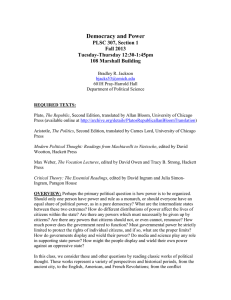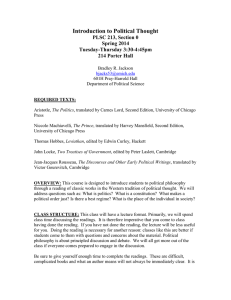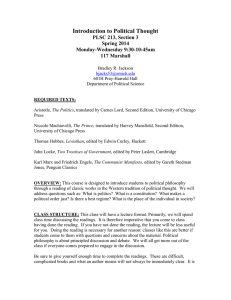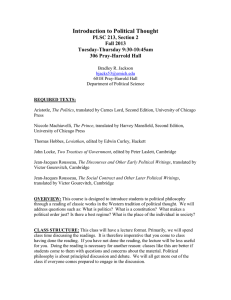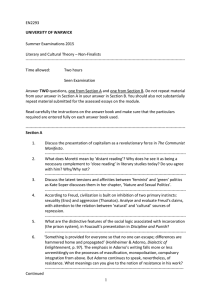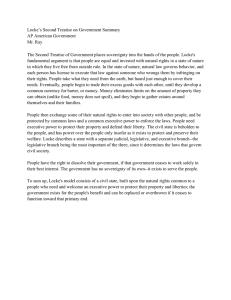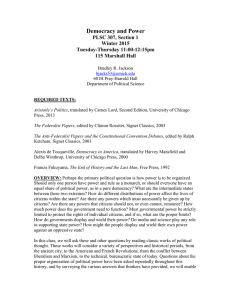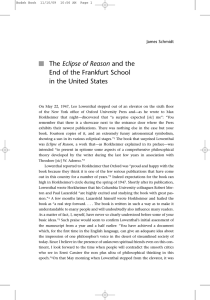Democracy and Power PLSC 307, Section 1 Spring 2014
advertisement
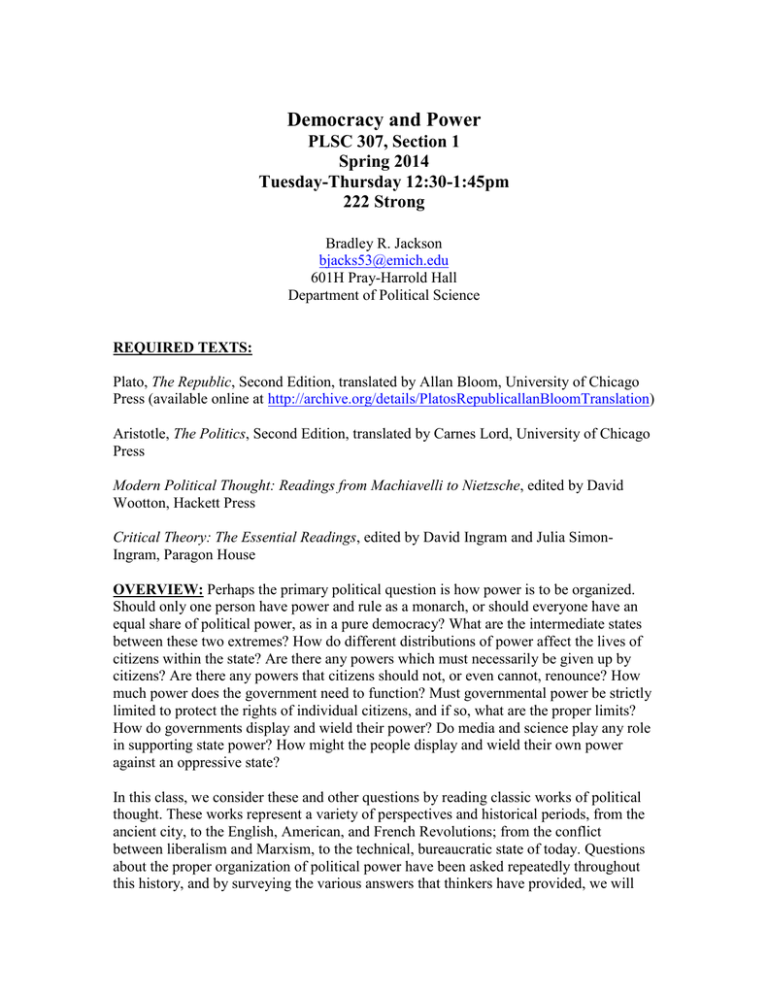
Democracy and Power PLSC 307, Section 1 Spring 2014 Tuesday-Thursday 12:30-1:45pm 222 Strong Bradley R. Jackson bjacks53@emich.edu 601H Pray-Harrold Hall Department of Political Science REQUIRED TEXTS: Plato, The Republic, Second Edition, translated by Allan Bloom, University of Chicago Press (available online at http://archive.org/details/PlatosRepublicallanBloomTranslation) Aristotle, The Politics, Second Edition, translated by Carnes Lord, University of Chicago Press Modern Political Thought: Readings from Machiavelli to Nietzsche, edited by David Wootton, Hackett Press Critical Theory: The Essential Readings, edited by David Ingram and Julia SimonIngram, Paragon House OVERVIEW: Perhaps the primary political question is how power is to be organized. Should only one person have power and rule as a monarch, or should everyone have an equal share of political power, as in a pure democracy? What are the intermediate states between these two extremes? How do different distributions of power affect the lives of citizens within the state? Are there any powers which must necessarily be given up by citizens? Are there any powers that citizens should not, or even cannot, renounce? How much power does the government need to function? Must governmental power be strictly limited to protect the rights of individual citizens, and if so, what are the proper limits? How do governments display and wield their power? Do media and science play any role in supporting state power? How might the people display and wield their own power against an oppressive state? In this class, we consider these and other questions by reading classic works of political thought. These works represent a variety of perspectives and historical periods, from the ancient city, to the English, American, and French Revolutions; from the conflict between liberalism and Marxism, to the technical, bureaucratic state of today. Questions about the proper organization of political power have been asked repeatedly throughout this history, and by surveying the various answers that thinkers have provided, we will enable ourselves to think through these questions again for ourselves with reference to our own world. The question of how political power should be distributed is a question that remains alive today, and this class is designed to offer the conceptual resources necessary for considering these vital problems. Students will be asked to connect the thoughts and arguments found in the readings to contemporary issues in America and the rest of the world. It is hoped that this will encourage active, thoughtful engagement with contemporary events, while simultaneously adding depth to our historical and theoretical knowledge of politics. CLASS STRUCTURE: This class will have a lecture format. Primarily, we will spend class time discussing the readings. It is therefore imperative that you come to class having done the reading. If you have not done the reading, the lecture will be less useful for you. Doing the reading is necessary for another reason: classes like this are better if students come to them with questions and concerns about the material. Political philosophy is about principled discussion and debate. We will all get more out of the class if everyone comes prepared to engage in the discussion. Be sure to give yourself enough time to complete the readings. These are difficult, complicated books and what an author means will not always be immediately clear. It is important that you take time to read these works carefully, since you will be evaluated primarily on your understanding of these texts. ASSIGNMENTS: Grades in this class will be determined based on the following: (1) Six short (500 words) papers in which you relate the concepts in class to some event in the current news. These papers can be turned in at any point during the semester. However, no more than one paper may be turned per week. Each paper should be about a different news story. You should not, for example, write two papers on the same event, even if you can find two news stories about it. Together, these papers are worth 12% of the final grade. (2) Two short (1500 words) essays on topics assigned in class or agreed upon by the student and instructor. These will be distributed one week before they are due. The first is due Tuesday 2/11; the second is due Thursday 3/20. Please bring a paper copy to class the day the assignment is due. Together, these papers are worth 40% of the final grade. (3) One long (3000 word) essay on a topic assigned in class or agreed upon by the student and the instructor. Topics will be distributed after the Thanksgiving break. This paper is due on Thursday 4/17, the last day of class. Please bring a paper copy to class. This essay is worth 40% of the final grade. (4) Participation. This sort of class is improved by student participation. Questions and comments are not only encouraged, they are also required and worth 8% of the final grade. GRADING SCALE: A AB+ B BC+ C CD+ D DF 96-100 91-95 85-90 80-84 76-79 72-75 68-71 64-68 60-63 55-59 50-54 <50 4 3.7 3.3 3 2.7 2.3 2 1.7 1.3 1 0.7 0 ACADEMIC HONESTY POLICY: Plagiarism of any kind will not be tolerated. This includes using direct quotes or close paraphrases without attribution. Use of Wikipedia is unacceptable, even if cited. Failure to comply with the academic honesty policy will result in a failing grade on the assignment in question as well as referral to appropriate university authorities for disciplinary action. STUDENTS WITH DISABILITIES: Students with disabilities should contact the Disability Resource Center to establish reasonable accommodations. For an appointment with a disability specialist, visit http://www.emich.edu/drc/. SCHEDULE: Th 1/9 Tu 1/14 Th 1/16 Tu 1/21 Introduction Plato Republic Book VIII Plato Republic Book VIII (cont) Aristotle, Politics Book III Th 1/23 Aristotle, Politics IV Tu 1/28 Th 1/30 Tu 2/4 Aristotle, Politics V Aristotle, Politics VI Hobbes, Leviathan X-XIII Th 2/6 Tu 2/11 Th 2/13 Tu 2/18 Th 2/20 Hobbes, Leviathan XIV-XVII Hobbes, Leviathan XVIII-XXI, XXIV, XXIX Locke, Second Treatise I-V Locke, Second Treatise VI-IX Locke, Second Treatise X-XIV Tu 3/4 Th 3/6 Locke, Second Treatise XV-XIX Rousseau, Second Discourse Assignment 1 Due Tu 3/11 Th 3/13 Tu 3/18 Rousseau, Second Discourse (cont.) Rousseau, Second Discourse (cont.) Tu 3/25 Th 3.27 Marx, The Communist Manifesto Marx, The Communist Manifesto (cont.) Marx, The Communist Manifesto (cont.) Nietzsche, Genealogy of Morals Tu 4/1 Nietzsche, Genealogy of Morals (cont.) Th 3/20 Th 4/3 Tu 4/8 Th 4/10 Tu 4/15 Th 4/17 Nietzsche, Genealogy of Morals (cont.) Critical Theory: Marcuse, "Philosophy and Critical Theory" Horkheimer, “Traditional and Critical Theory” Critical Theory: Horkheimer, “Means and Ends” Adorno and Horkheimer, "The Concept of Enlightment" Critical Theory: Adorno, “Society” Adorno, “How to Look at Television” Adorno, “Freudian Theory and the Pattern of Fascist Propaganda” Critical Theory: Marcuse, “The Catastrophe of Liberation” Habermas, "Technology and Science as Ideology" Assignment 2 Due Long Essay Due
